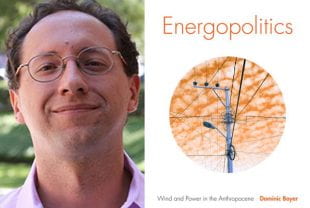Energy transition has become a popular topic of political discussion and policy intervention. But just how do politics-on-the-ground impact the development of more renewable energy options like wind power?

Dominic Boyer and the cover of “Energopolitics.” Photo credit: Rice University/Duke University Press.
“Energopolitics” (Duke University Press, 257 pages, $25.95), a new book from Dominic Boyer, a professor of anthropology at Rice University, explores this topic as part of a project shared with his research partner, Rice associate professor of anthropology Cymene Howe. His book is half of a duograph, a combination of two different books written by two different authors drawing on shared research and fieldwork. They can be read separately or in connection with each other.
The book recounts Boyer and Howe’s fieldwork in Mexico’s Isthmus of Tehuantepec. There they tracked, among other projects, the stalled development of what would have been Latin America’s largest wind park – Mareña Renovables – as part of the densest concentration of terrestrial wind parks anywhere in the world.
Boyer’s book explores the political history and culture behind resistance to wind power in the isthmus. The resistance had many origins and motivations, ranging from demands for indigenous sovereignty to feelings of governmental abandonment to concerns about the motives behind corporate investment.
“Those who are resisting wind parks in the Isthmus of Tehuantepec are not really resisting wind power per se,” he said. “They are struggling to assert local sovereignty against centuries-old tendencies toward extraction and expropriation that have defined the Mexican government’s relationship with this region. People would be perfectly happy with wind power if they didn’t feel that it was being planned far away and then imposed upon them.”
Drawing on his interviews with activists, bankers, bureaucrats, farmers, engineers and politicians, Boyer explained the impact of energy and fuel on political power in the area, and vice versa. He also provided insight on how to make sense of the complicated relationships that ultimately impacted the development of wind power.
“The isthmus has some of the best technical wind resources on the entire planet,” Boyer said. “But the technical challenge is nothing next to the social challenge of finding a way to develop the resource that makes all these many shareholders feel engaged and empowered. Thus far, wind development has really only benefitted transnational corporations and banks and some local elites. The pressure is to develop a model of wind power whose benefits are spread more widely.”
Boyer hopes the book will shed light on the political challenges of rapid renewable energy development and help show the way toward more just energy transitions in Latin America and across the world.
“We came to Mexico as advocates for rapid renewable energy transition and we left Mexico with that conviction intact,” he said. “What we learned, however, is that renewable energy transition will be meaningless unless it also breaks with the extractivist mindset of the fossil fuel era. Yes, we need energy transition to fight climate change. But we need to do it in such a way that the communities who give land for these projects feel like it is giving them a better future.”
For more information on the book, visit https://www.dukeupress.edu/energopolitics.

